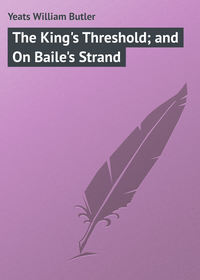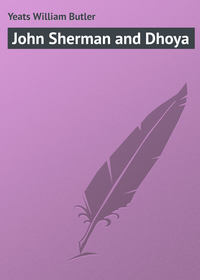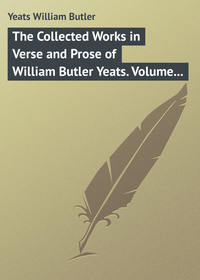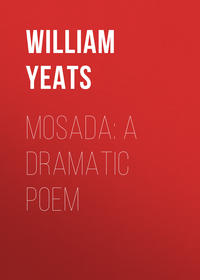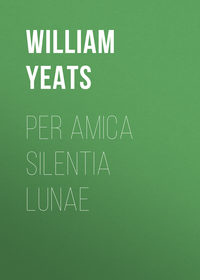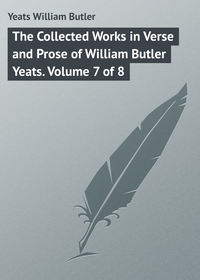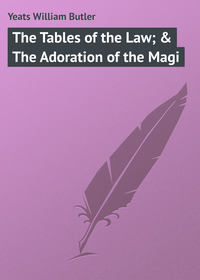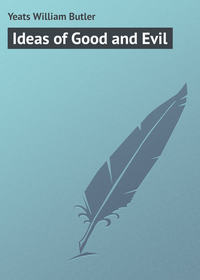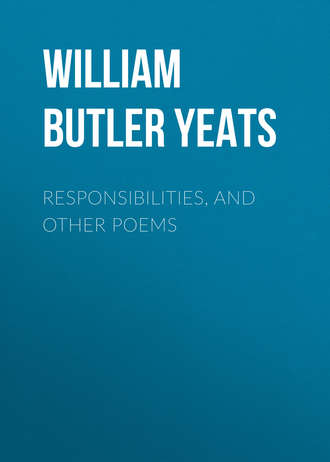 полная версия
полная версияResponsibilities, and other poems
THE WELL AND THE TREE
'The Man that I praise,'Cries out the empty well,'Lives all his daysWhere a hand on the bellCan call the milch-cowsTo the comfortable door of his house.Who but an idiot would praiseDry stones in a well?''The Man that I praise,'Cries out the leafless tree,'Has married and staysBy an old hearth, and heOn naught has set storeBut children and dogs on the floor.Who but an idiot would praiseA withered tree?'RUNNING TO PARADISE
As I came over Windy GapThey threw a halfpenny into my cap,For I am running to Paradise;And all that I need do is to wishAnd somebody puts his hand in the dishTo throw me a bit of salted fish:And there the king is but as the beggar.My brother Mourteen is worn outWith skelping his big brawling lout,And I am running to Paradise;A poor life do what he can,And though he keep a dog and a gun,A serving maid and a serving man:And there the king is but as the beggar.Poor men have grown to be rich men,And rich men grown to be poor again,And I am running to Paradise;And many a darling wit's grown dullThat tossed a bare heel when at school,Now it has filled an old sock full:And there the king is but as the beggar.The wind is old and still at playWhile I must hurry upon my way,For I am running to Paradise;Yet never have I lit on a friendTo take my fancy like the windThat nobody can buy or bind:And there the king is but as the beggar.THE HOUR BEFORE DAWN
A one-legged, one-armed, one-eyed man,A bundle of rags upon a crutch,Stumbled on windy CruachanCursing the wind. It was as muchAs the one sturdy leg could doTo keep him upright while he cursed.He had counted, where long years agoQueen Maeve's nine Maines had been nursed,A pair of lapwings, one old sheepAnd not a house to the plain's edge,When close to his right hand a heapOf grey stones and a rocky ledgeReminded him that he could make,If he but shifted a few stones,A shelter till the daylight broke.But while he fumbled with the stonesThey toppled over; 'Were it notI have a lucky wooden shinI had been hurt'; and toppling broughtBefore his eyes, where stones had been,A dark deep hole in the rock's face.He gave a gasp and thought to run,Being certain it was no right placeBut the Hell Mouth at CruachanThat's stuffed with all that's old and bad,And yet stood still, because insideHe had seen a red-haired jolly ladIn some outlandish coat besideA ladle and a tub of beer,Plainly no phantom by his look.So with a laugh at his own fearHe crawled into that pleasant nook.Young Red-head stretched himself to yawnAnd murmured, 'May God curse the nightThat's grown uneasy near the dawnSo that it seems even I sleep light;And who are you that wakens me?Has one of Maeve's nine brawling sonsGrown tired of his own company?But let him keep his grave for onceI have to find the sleep I have lost.'And then at last being wide awake,'I took you for a brawling ghost,Say what you please, but from day-breakI'll sleep another century.'The beggar deaf to all but hopeWent down upon a hand and kneeAnd took the wooden ladle upAnd would have dipped it in the beerBut the other pushed his hand aside,'Before you have dipped it in the beerThat sacred Goban brewed,' he cried,'I'd have assurance that you are ableTo value beer – I will have no foolDipping his nose into my ladleBecause he has stumbled on this holeIn the bad hour before the dawn.If you but drink that beer and sayI will sleep until the winter's gone,Or maybe, to Midsummer DayYou will sleep that length; and at the firstI waited so for that or this —Because the weather was a-cursedOr I had no woman there to kiss,And slept for half a year or so;But year by year I found that lessGave me such pleasure I'd forgoEven a half hour's nothingness,And when at one year's end I foundI had not waked a single minute,I chose this burrow under ground.I will sleep away all Time within it:My sleep were now nine centuriesBut for those mornings when I findThe lapwing at their foolish criesAnd the sheep bleating at the windAs when I also played the fool.'The beggar in a rage beganUpon his hunkers in the hole,'It's plain that you are no right manTo mock at everything I loveAs if it were not worth the doing.I'd have a merry life enoughIf a good Easter wind were blowing,And though the winter wind is badI should not be too down in the mouthFor anything you did or saidIf but this wind were in the south.'But the other cried, 'You long for springOr that the wind would shift a pointAnd do not know that you would bring,If time were suppler in the joint,Neither the spring nor the south windBut the hour when you shall pass awayAnd leave no smoking wick behind,For all life longs for the Last DayAnd there's no man but cocks his earTo know when Michael's trumpet criesThat flesh and bone may disappear,And souls as if they were but sighs,And there be nothing but God left;But I alone being blessed keepLike some old rabbit to my cleftAnd wait Him in a drunken sleep.'He dipped his ladle in the tubAnd drank and yawned and stretched him out.The other shouted, 'You would robMy life of every pleasant thoughtAnd every comfortable thingAnd so take that and that.' ThereonHe gave him a great pummelling,But might have pummelled at a stoneFor all the sleeper knew or cared;And after heaped the stones againAnd cursed and prayed, and prayed and cursed:'Oh God if he got loose!' And thenIn fury and in panic fledFrom the Hell Mouth at CruachanAnd gave God thanks that overheadThe clouds were brightening with the dawn.THE PLAYER QUEEN
(Song from an Unfinished Play)My mother dandled me and sang,'How young it is, how young!'And made a golden cradleThat on a willow swung.'He went away,' my mother sang,'When I was brought to bed,'And all the while her needle pulledThe gold and silver thread.She pulled the thread and bit the threadAnd made a golden gown,And wept because she had dreamt that IWas born to wear a crown.'When she was got,' my mother sang,'I heard a sea-mew cry,And saw a flake of the yellow foamThat dropped upon my thigh.'How therefore could she help but braidThe gold into my hair,And dream that I should carryThe golden top of care?THE REALISTS
Hope that you may understand!What can books of men that wiveIn a dragon-guarded land,Paintings of the dolphin-drawnSea-nymphs in their pearly waggonsDo, but awake a hope to liveThat had goneWith the dragons?ITHE WITCHToil, and grow rich,What's that but to lieWith a foul witchAnd after, drained dry,To be broughtTo the chamber whereLies one long soughtWith despair.IITHE PEACOCKWhat's riches to himThat has made a great peacockWith the pride of his eye?The wind-beaten, stone-grey,And desolate Three-rockWould nourish his whim.Live he or dieAmid wet rocks and heather,His ghost will be gayAdding feather to featherFor the pride of his eye.THE MOUNTAIN TOMB
Pour wine and dance if Manhood still have pride,Bring roses if the rose be yet in bloom;The cataract smokes upon the mountain side,Our Father Rosicross is in his tomb.Pull down the blinds, bring fiddle and clarionetThat there be no foot silent in the roomNor mouth from kissing, nor from wine unwet;Our Father Rosicross is in his tomb.In vain, in vain; the cataract still criesThe everlasting taper lights the gloom;All wisdom shut into his onyx eyesOur Father Rosicross sleeps in his tomb.TO A CHILD DANCING IN THE WIND
IDance there upon the shore;What need have you to careFor wind or water's roar?And tumble out your hairThat the salt drops have wet;Being young you have not knownThe fool's triumph, nor yetLove lost as soon as won,Nor the best labourer deadAnd all the sheaves to bind.What need have you to dreadThe monstrous crying of wind?IIHas no one said those daringKind eyes should be more learn'd?Or warned you how despairingThe moths are when they are burned,I could have warned you, but you are young,So we speak a different tongue.O you will take whatever's offeredAnd dream that all the world's a friend,Suffer as your mother suffered,Be as broken in the end.But I am old and you are young,And I speak a barbarous tongue.A MEMORY OF YOUTH
The moments passed as at a play,I had the wisdom love brings forth;I had my share of mother witAnd yet for all that I could say,And though I had her praise for it,A cloud blown from the cut-throat northSuddenly hid love's moon away.Believing every word I saidI praised her body and her mindTill pride had made her eyes grow bright,And pleasure made her cheeks grow red,And vanity her footfall light,Yet we, for all that praise, could findNothing but darkness overhead.We sat as silent as a stone,We knew, though she'd not said a word,That even the best of love must die,And had been savagely undoneWere it not that love upon the cryOf a most ridiculous little birdTore from the clouds his marvellous moon.FALLEN MAJESTY
Although crowds gathered once if she but showed her face,And even old men's eyes grew dim, this hand alone,Like some last courtier at a gypsy camping place,Babbling of fallen majesty, records what's gone.The lineaments, a heart that laughter has made sweet,These, these remain, but I record what's gone. A crowdWill gather, and not know it walks the very streetWhereon a thing once walked that seemed a burning cloud.FRIENDS
Now must I these three praise —Three women that have wroughtWhat joy is in my days;One that no passing thought,Nor those unpassing cares,No, not in these fifteenMany times troubled years,Could ever come betweenHeart and delighted heart;And one because her handHad strength that could unbindWhat none can understand,What none can have and thrive,Youth's dreamy load, till sheSo changed me that I liveLabouring in ecstasy.And what of her that tookAll till my youth was goneWith scarce a pitying look?How should I praise that one?When day begins to breakI count my good and bad,Being wakeful for her sake,Remembering what she had,What eagle look still shows,While up from my heart's rootSo great a sweetness flowsI shake from head to foot.THE COLD HEAVEN
Suddenly I saw the cold and rook-delighting HeavenThat seemed as though ice burned and was but the more ice,And thereupon imagination and heart were drivenSo wild that every casual thought of that and thisVanished, and left but memories, that should be out of seasonWith the hot blood of youth, of love crossed long ago;And I took all the blame out of all sense and reason,Until I cried and trembled and rocked to and fro,Riddled with light. Ah! when the ghost begins to quicken,Confusion of the death-bed over, is it sentOut naked on the roads, as the books say, and strickenBy the injustice of the skies for punishment?THAT THE NIGHT COME
She lived in storm and strife,Her soul had such desireFor what proud death may bringThat it could not endureThe common good of life,But lived as 'twere a kingThat packed his marriage dayWith banneret and pennon,Trumpet and kettledrum,And the outrageous cannon,To bundle time awayThat the night come.AN APPOINTMENT
Being out of heart with governmentI took a broken root to flingWhere the proud, wayward squirrel went,Taking delight that he could spring;And he, with that low whinnying soundThat is like laughter, sprang againAnd so to the other tree at a bound.Nor the tame will, nor timid brain,Bred that fierce tooth and cleanly limbAnd threw him up to laugh on the bough;No government appointed him.ITHE MAGINow as at all times I can see in the mind's eye,In their stiff, painted clothes, the pale unsatisfied onesAppear and disappear in the blue depth of the skyWith all their ancient faces like rain-beaten stones,And all their helms of silver hovering side by side,And all their eyes still fixed, hoping to find once more,Being by Calvary's turbulence unsatisfied,The uncontrollable mystery on the bestial floor.IITHE DOLLSA doll in the doll-maker's houseLooks at the cradle and balls:'That is an insult to us.'But the oldest of all the dollsWho had seen, being kept for show,Generations of his sort,Out-screams the whole shelf: 'AlthoughThere's not a man can reportEvil of this place,The man and the woman bringHither to our disgrace,A noisy and filthy thing.'Hearing him groan and stretchThe doll-maker's wife is awareHer husband has heard the wretch,And crouched by the arm of his chair,She murmurs into his ear,Head upon shoulder leant:'My dear, my dear, oh dear,It was an accident.'A COAT
I made my song a coatCovered with embroideriesOut of old mythologiesFrom heel to throat;But the fools caught it,Wore it in the world's eyeAs though they'd wrought it.Song, let them take itFor there's more enterpriseIn walking naked.[CLOSING RHYMES]
While I, from that reed-throated whispererWho comes at need, although not now as onceA clear articulation in the airBut inwardly, surmise companionsBeyond the fling of the dull ass's hoof,– Ben Jonson's phrase – and find when June is comeAt Kyle-na-no under that ancient roofA sterner conscience and a friendlier home,I can forgive even that wrong of wrongs,Those undreamt accidents that have made me– Seeing that Fame has perished this long whileBeing but a part of ancient ceremony —Notorious, till all my priceless thingsAre but a post the passing dogs defile.FROM THE GREEN HELMET AND OTHER POEMS
HIS DREAM
I swayed upon the gaudy sternThe butt end of a steering oar,And everywhere that I could turnMen ran upon the shore.And though I would have hushed the crowdThere was no mother's son but said,'What is the figure in a shroudUpon a gaudy bed?'And fishes bubbling to the brimCried out upon that thing beneath,– It had such dignity of limb —By the sweet name of Death.Though I'd my finger on my lip,What could I but take up the song?And fish and crowd and gaudy shipCried out the whole night long,Crying amid the glittering sea,Naming it with ecstatic breath,Because it had such dignityBy the sweet name of Death.A WOMAN HOMER SUNG
If any man drew nearWhen I was young,I thought, 'He holds her dear,'And shook with hate and fear.But oh, 'twas bitter wrongIf he could pass her byWith an indifferent eye.Whereon I wrote and wrought,And now, being grey,I dream that I have broughtTo such a pitch my thoughtThat coming time can say,'He shadowed in a glassWhat thing her body was.'For she had fiery bloodWhen I was young,And trod so sweetly proudAs 'twere upon a cloud,A woman Homer sung,That life and letters seemBut an heroic dream.THE CONSOLATION
I had this thought awhile ago,'My darling cannot understandWhat I have done, or what would doIn this blind bitter land.'And I grew weary of the sunUntil my thoughts cleared up again,Remembering that the best I have doneWas done to make it plain;That every year I have cried, 'At lengthMy darling understands it all,Because I have come into my strength,And words obey my call.'That had she done so who can sayWhat would have shaken from the sieve?I might have thrown poor words awayAnd been content to live.NO SECOND TROY
Why should I blame her that she filled my daysWith misery, or that she would of lateHave taught to ignorant men most violent ways,Or hurled the little streets upon the great,Had they but courage equal to desire?What could have made her peaceful with a mindThat nobleness made simple as a fire,With beauty like a tightened bow, a kindThat is not natural in an age like this,Being high and solitary and most stern?Why, what could she have done being what she is?Was there another Troy for her to burn?RECONCILIATION
Some may have blamed you that you took awayThe verses that could move them on the dayWhen, the ears being deafened, the sight of the eyes blindWith lightning you went from me, and I could findNothing to make a song about but kings,Helmets, and swords, and half-forgotten thingsThat were like memories of you – but nowWe'll out, for the world lives as long ago;And while we're in our laughing, weeping fit,Hurl helmets, crowns, and swords into the pit.But, dear, cling close to me; since you were gone,My barren thoughts have chilled me to the bone.KING AND NO KING
'Would it were anything but merely voice!'The No King cried who after that was King,Because he had not heard of anythingThat balanced with a word is more than noise;Yet Old Romance being kind, let him prevailSomewhere or somehow that I have forgot,Though he'd but cannon – Whereas we that had thoughtTo have lit upon as clean and sweet a taleHave been defeated by that pledge you gaveIn momentary anger long ago;And I that have not your faith, how shall I knowThat in the blinding light beyond the graveWe'll find so good a thing as that we have lost?The hourly kindness, the day's common speech,The habitual content of each with eachWhen neither soul nor body has been crossed.PEACE
Ah, that Time could touch a formThat could show what Homer's ageBred to be a hero's wage.'Were not all her life but storm,Would not painters paint a formOf such noble lines,' I said,'Such a delicate high head,All that sternness amid charm,All that sweetness amid strength?'Ah, but peace that comes at length,Came when Time had touched her form.AGAINST UNWORTHY PRAISE
O heart, be at peace, becauseNor knave nor dolt can breakWhat's not for their applause,Being for a woman's sake.Enough if the work has seemed,So did she your strength renew,A dream that a lion had dreamedTill the wilderness cried aloud,A secret between you two,Between the proud and the proud.What, still you would have their praise!But here's a haughtier text,The labyrinth of her daysThat her own strangeness perplexed;And how what her dreaming gaveEarned slander, ingratitude,From self-same dolt and knave;Aye, and worse wrong than these,Yet she, singing upon her road,Half lion, half child, is at peace.THE FASCINATION OF WHAT'S DIFFICULT
The fascination of what's difficultHas dried the sap out of my veins, and rentSpontaneous joy and natural contentOut of my heart. There's something ails our coltThat must, as if it had not holy blood,Nor on an Olympus leaped from cloud to cloud,Shiver under the lash, strain, sweat and joltAs though it dragged road metal. My curse on playsThat have to be set up in fifty ways,On the day's war with every knave and dolt,Theatre business, management of men.I swear before the dawn comes round againI'll find the stable and pull out the bolt.A DRINKING SONG
Wine comes in at the mouthAnd love comes in at the eye;That's all we shall know for truthBefore we grow old and die.I lift the glass to my mouth,I look at you, and I sigh.THE COMING OF WISDOM WITH TIME
Though leaves are many, the root is one;Through all the lying days of my youthI swayed my leaves and flowers in the sun;Now I may wither into the truth.ON HEARING THAT THE STUDENTS OF OUR NEW UNIVERSITY HAVE JOINED THE ANCIENT ORDER OF HIBERNIANS AND THE AGITATION AGAINST IMMORAL LITERATURE
Where, where but here have Pride and Truth,That long to give themselves for wage,To shake their wicked sides at youthRestraining reckless middle-age.TO A POET, WHO WOULD HAVE ME PRAISE CERTAIN BAD POETS, IMITATORS OF HIS AND MINE
You say, as I have often given tongueIn praise of what another's said or sung,'Twere politic to do the like by these;But have you known a dog to praise his fleas?THE MASK
'Put off that mask of burning goldWith emerald eyes.''O no, my dear, you make so boldTo find if hearts be wild and wise,And yet not cold.''I would but find what's there to find,Love or deceit.''It was the mask engaged your mind,And after set your heart to beat,Not what's behind.''But lest you are my enemy,I must enquire.''O no, my dear, let all that be,What matter, so there is but fireIn you, in me?'UPON A HOUSE SHAKEN BY THE LAND AGITATION
How should the world be luckier if this house,Where passion and precision have been oneTime out of mind, became too ruinousTo breed the lidless eye that loves the sun?And the sweet laughing eagle thoughts that growWhere wings have memory of wings, and allThat comes of the best knit to the best? AlthoughMean roof-trees were the sturdier for its fall,How should their luck run high enough to reachThe gifts that govern men, and after theseTo gradual Time's last gift, a written speechWrought of high laughter, loveliness and ease?AT THE ABBEY THEATRE
(Imitated from Ronsard)Dear Craoibhin Aoibhin, look into our case.When we are high and airy hundreds sayThat if we hold that flight they'll leave the place,While those same hundreds mock another dayBecause we have made our art of common things,So bitterly, you'd dream they longed to lookAll their lives through into some drift of wings.You've dandled them and fed them from the bookAnd know them to the bone; impart to us —We'll keep the secret – a new trick to please.Is there a bridle for this ProteusThat turns and changes like his draughty seas?Or is there none, most popular of men,But when they mock us that we mock again?THESE ARE THE CLOUDS
These are the clouds about the fallen sun,The majesty that shuts his burning eye;The weak lay hand on what the strong has done,Till that be tumbled that was lifted highAnd discord follow upon unison,And all things at one common level lie.And therefore, friend, if your great race were runAnd these things came, so much the more therebyHave you made greatness your companion,Although it be for children that you sigh:These are the clouds about the fallen sun,The majesty that shuts his burning eye.AT GALWAY RACES
There where the course is,Delight makes all of the one mind,The riders upon the galloping horses,The crowd that closes in behind:We, too, had good attendance once,Hearers and hearteners of the work;Aye, horsemen for companions,Before the merchant and the clerkBreathed on the world with timid breath.Sing on: sometime, and at some new moon,We'll learn that sleeping is not death,Hearing the whole earth change its tune,Its flesh being wild, and it againCrying aloud as the race course is,And we find hearteners among menThat ride upon horses.A FRIEND'S ILLNESS
Sickness brought me thisThought, in that scale of his:Why should I be dismayedThough flame had burned the wholeWorld, as it were a coal,Now I have seen it weighedAgainst a soul?ALL THINGS CAN TEMPT ME
All things can tempt me from this craft of verse:One time it was a woman's face, or worse —The seeming needs of my fool-driven land;Now nothing but comes readier to the handThan this accustomed toil. When I was young,I had not given a penny for a songDid not the poet sing it with such airsThat one believed he had a sword upstairs;Yet would be now, could I but have my wish,Colder and dumber and deafer than a fish.THE YOUNG MAN'S SONG
I whispered, 'I am too young,'And then, 'I am old enough;'Wherefore I threw a pennyTo find out if I might love.'Go and love, go and love, young man,If the lady be young and fair.'Ah, penny, brown penny, brown penny,I am looped in the loops of her hair.Oh, love is the crooked thing,There is nobody wise enoughTo find out all that is in it,For he would be thinking of loveTill the stars had run away,And the shadows eaten the moon.Ah, penny, brown penny, brown penny,One cannot begin it too soon.THE HOUR-GLASS
NEW VERSION – 1912
THE HOUR-GLASS
THE PERSONS OF THE PLAYWise Man.Bridget, his wife.Teigue, a fool.Angel.Children and Pupils.Pupils come in and stand before the stage curtain, which is still closed. One pupil carries a bookFirst Pupil
He said we might choose the subject for the lesson.
Second Pupil
There is none of us wise enough to do that.
Third Pupil
It would need a great deal of wisdom to know what it is we want to know.
Fourth Pupil
I will question him.
Fifth Pupil
You?
Fourth Pupil
Last night I dreamt that some one came and told me to question him. I was to say to him, 'You were wrong to say there is no God and no soul – maybe, if there is not much of either, there is yet some tatters, some tag on the wind – so to speak – some rag upon a bush, some bob-tail of a god.' I will argue with him, – nonsense though it be – according to my dream, and you will see how well I can argue, and what thoughts I have.




